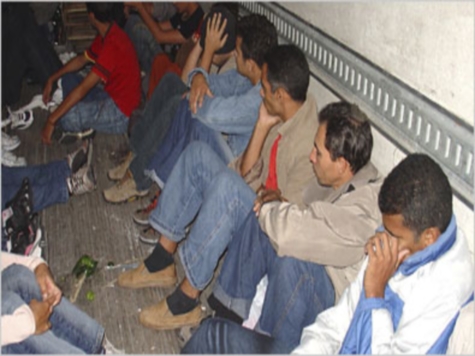The free movement of people within the European Union is “extensively exploited by organised criminals to bring illicit commodities including drugs, human trafficking victims, illegal immigrants and counterfeit goods to Britain,” according to a government report.
Spain, Italy, Belgium and the Netherlands are key entry and distribution hubs for drugs and other illicit goods before they reach the UK.
Europol, the EU’s law enforcement agency, admits that “the free movement of people and goods across the EU’s internal borders reduces the chance of detection,” according the report which is part of a series of government reviews on the impact of the EU on Britain.
The report also looks at the impact of the EU’s guarantee of “free movement for persons” on the labour market: “Whilst there is broad consensus that highly skilled migrants from the EU have been beneficial to the UK, there is less agreement regarding low skilled migration, with some arguing that gains for employers are offset by negative impacts on the lowest paid workers.”
There had been a downward pressure on wages as a result of the volume of low-skilled migration.
“The evidence shows that the effects of free movement are felt differently by different individuals, and particularly at different ends of the income scale… the biggest ‘winners’ from immigration (both EU and non-EU) are the migrants themselves, and the companies that employ them. The biggest ‘losers’ are workers employed in low-paid jobs.”
These workers are likely to include those competing directly with new immigrant workers. This group includes some ethnic minorities and a significant share of immigrants already working in the UK.
“Some reports have found evidence of immigration having a negative impact on wages and employment of UK natives in low skilled sectors…a 10 per cent rise in the proportion of immigrants working in semi/unskilled services – that is in care homes, bars, shops, restaurants, cleaning, for example – leads to a 5.2 per cent reduction in pay.”
Increased immigration has also had an impact on education, with the report noting an increased pressure on school places: “Two-thirds of councils in England could see more children looking to start primary school in their area by September 2016 than they currently have places available for.”
“The driver has been the birth rate rising more quickly than at any time since the 1950s. According to the Office of National Statistics around half of the increase is due to increasing immigration. A quarter of births (25.1 percent) in 2010 were to mothers born outside the UK.”
The report on free movement of peoples is meant to position the government for one of the key issues Prime Minister David Cameron says he will present in his planned re-negotiation of powers with Brussels. The report reflects government policy that: “The scope of free movement rights has now expanded beyond their original intention, and is no longer limited to economic factors.”
“Over time, the right to free movement has been progressively extended from its original focus on workers to apply also to job-seekers, the self-employed, students and the self-sufficient, including, for example, retired persons.”
The government report cites Articles 48 to 50 of the 1957 Treaty of Rome, the founding document of the then-European Economic Community (EEC), to support its claim that “the free movement rights set out in the Treaty of Rome were confined to persons who exercised economic activity.”
However, the fact is that Article 3 of the treaty made it clear for the countries signing the treaty, which at that time did not include the UK, that “… the activities of the Community shall include… the abolition, as between Member States, of obstacles to freedom of movement for persons…” No mention there of “economic activity.”
Despite what the government’s report and government ministers say, any reading of the founders of the European movement show that the “original intent” was always to use the “four freedoms” – freedom of movement of people, goods, services and capital – and the increasing regulation of them as a means to grow a “government of Europe.”
And despite the government’s insistence that they want to restrict the freedom of movement for people, at the end of the report the government admits it has recently adopted “new EU legislation, including a new Directive to promote and enforce the free movement rights of workers, and a revised Directive on the mutual recognition of professional qualifications.
“The Government is preparing to implement these Directives.”

COMMENTS
Please let us know if you're having issues with commenting.